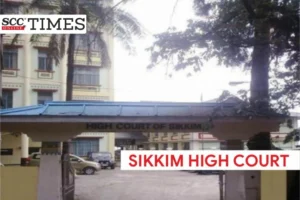Sikkim High Court: In a civil revisional petition filed by the revisionist seeking to assail an order of the Trial Court that rejected the petitioner’s application against a compromise deed derived through mediation between her and the respondent 2, both of whom claimed to be the wife of the deceased pensioner, the Single Bench comprising of Bhaskar Raj Pradhan, J.*, upheld the Trial Court’s order and held that the revisionist was bound by the compromise deed. The Court also held that the Pension Act, 1871, having not been brought into force in Sikkim as required under Article 371F (n) of the Constitution, is not applicable in the State of Sikkim, therefore, the legislation did not apply to the case.
Background
The parties (revisionist and respondent no. 2) to the present revision petition claimed to be the wives of the deceased pensioner. The revisionist sought to assail the order of the Civil Judge, East Sikkim at Gangtok rejecting the application filed by her under Order XXIII Rule 3 read with Section 151 of the Code of Civil procedure, 1908 (“CPC”), which held that the compromise deed did not contravene the provisions of Sections 4 and 11 of the Pension Act, 1871 (“Pension Act”), and that the compromise deed is not void and unlawful.
A title suit was filed amongst the respondents in the instant case, within which the revisionist was impleaded. During the title suit, the matter was referred to mediation and the dispute was amicably settled between the parties. Consequently, a compromise deed was entered into between the parties. Thereafter, the revisionist moved an application under the proviso of Order XXIII Rule 3 read with Section 151 of the CPC for setting aside the compromise deed as being unlawful and barred by law, and for the restoration of the title suit to the stage prior to the settlement, which was rejected. Consequently, the revisionist filed the instant revision petition seeking to invoke the powers of the High Court under Section 115 of the CPC.
Issues before the Court
- Whether the present revision petition is maintainable under Section 115 of the CPC
-
Whether the Pension Act barred the revisionist from entering a compromise deed?
Decision of the Court
It was stated that it is settled law that the High Court would invoke the power of revision under Section 115 only when it is found that the Trial Court has exercised its jurisdiction not vested in it by law, or failed to exercise jurisdiction so vested, or has acted in exercise of its jurisdiction illegally or with material irregularity. Regarding the exercise of the revision power, the Court said that it shall not vary or reverse any order, unless such order, if made in the revisionist’s favour would have finally disposed of the suit To substantiate on this matter, the Court referred to the case of Shiv Shakti Coop. Housing Society v. Swaraj Developers, (2003) 6 SCC 659, wherein, the Supreme Court opined that a plain reading of Section 115, CPC clarifies that the emphasis is on the question whether the order in favour of revision applicant would have given finality to suit or other proceeding. If the answer is “yes” then the revision is maintainable, and if the answer is “no” then the revision is not maintainable.
Further, insofar as the submission that the compromise deed was against the Pension Act the Trial Court after examining Sections 4 and 11 of the Pensions Act, 1871 concluded that the title suit was for declaration, recovery of possession and other consequential relief in respect of two storied RCC building and not related to pension and therefore, it could not have been barred under Section 4 of the Pension Act, and the compromise deed did not contravene the provisions of the Pension Act, and that it was not void and unlawful. The Court did not see any illegality or material irregularity in the Trial Court’s rejection.
Deciding on the first issue in the matter, the Court noted that, in view of the proviso to Section 115 of the CPC if the application under Order XXII Rule 3 of the CPC was made in favour of the revisionist, it would not finally dispose of the suit or other proceedings as in the application under Order XXIII Rule 3 of the CPC the revisionist had herself sought inter alia, for restoration of the title suit to its stage prior to the compromise deed. Hence, had the impugned order been passed in favour of the revisionist, the suit would have continued from the stage prior to the compromise deed as prayed by her and therefore, there would be no finality to the suit.
Deciding on the second issue, as to whether the Pension Act has been brought into force in Sikkim in view of Article 371F (n) of the Constitution of India, it was held that the Pension Act had not been extended to Sikkim yet. . Thus, the contention of the revisionist that the Pension Act bars the compromise deed of sharing the pension with the respondents would not assist the revisionist in getting the relief prayed for. It was further held that Sikkim Government Services (Pension) Rules, 1990 and Sikkim Government Services (Revised Pension) Rules, 2010 also does not prohibit the revisionist from entering into such a compromise deed and therefore she is bound by the deed.
The Court finally held that the impugned order passed by the Trial Court did not require any interference and the revision petition thereby was dismissed.
[Prameela Gurung v. Urmila Manger, 2024 SCC OnLine Sikk 7, Decided on: 03-04-2024]
Judgment by: Bhaskar Raj Pradhan, J.
Advocates who appeared in this case :
Advocates for the Respondents: B. Sharma, Senior Advocate with Safal Sharma for the Respondent no.1, Lidya Pradhan for Respondent no.2.

